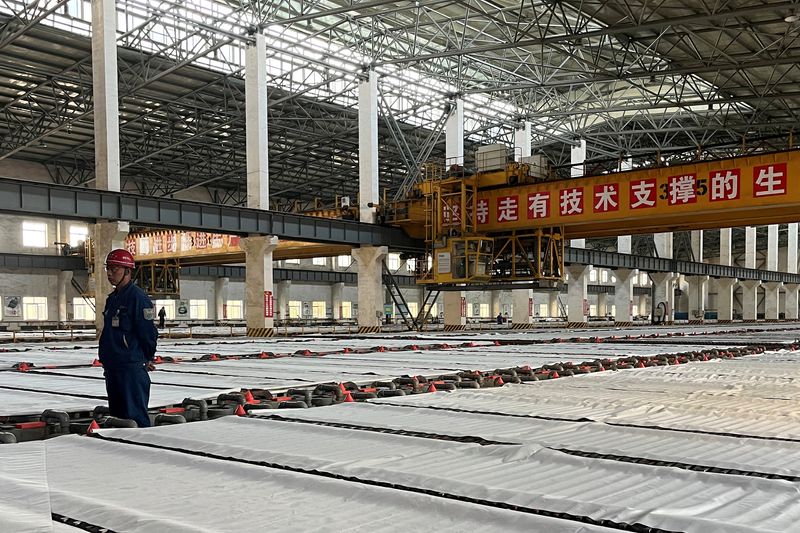By Andy Home
LONDON (Reuters) - An unprecedented collapse in conversion fees spells hard times for the global copper smelting sector.
The benchmark smelter treatment charges for next year have been set by Chilean copper miner Antofagasta (LON:ANTO) and China's Jiangxi Copper.
Smelters such as Jiangxi will receive just $21.50 per metric ton and 2.125 cents per pound for smelting and refining concentrates from Antofagasta's mines to make refined copper.
That is a huge drop from this year's benchmark of $80.00 per ton and 8.0 cents and the lowest outcome in at least 20 years.
At other times the plunge could have been read as a bullish sign of mine shortfall. But by copper's standards, mine supply has had a relatively untroubled year. Global production is on track to grow by 2.0% in 2024.
Rather, the tension is from the other side of the supply-demand equation.
Global smelter capacity has expanded too fast, particularly in China. Too many smelters are chasing a finite amount of feed and the competition could intensify in 2025.
EXUBERANT EXPANSION
China's copper smelting capacity will grow from 14.26 million tons in 2024 to 16 million in 2025 and close to 17 million in 2027, Ge Honglin, chairman of the China Nonferrous Metals Industry Association, told a conference in late October.
Fierce competition for raw materials to feed all this new capacity has kept spot smelter treatment charges at rock-bottom levels this year.
The country's leading producers met in March and agreed to curb output to prevent processing fees from falling further.
Any cuts they made were only enough to brake the production momentum. National output still grew by 5.0% year-on-year in January-November, according to local data provider Shanghai Metal Market.
That's why the shortfall in mined concentrates has not been reflected in the refined metal segment of the copper supply-chain.
Indeed, the International Copper Study Group (ICSG) estimates the global refined copper market registered a 402,000-ton supply surplus in the first nine months of the year.
MARGIN SQUEEZE
Smelters do not only rely on treatment charges for their revenue.
They can make money from by-products such as gold, silver and sulphuric acid. They can tweak payability and payment term clauses to enhance revenues.
They can also opt to split their pricing between the annual benchmark in the first half of 2025 and the mid-year benchmark in the second half, although that only works if treatment charges have recovered by then.
But smelter ingenuity can only mitigate so much of the ongoing squeeze on margins.
China's smelter problems are about to be compounded by expansion in the rest of the world.
Smelters are coming online in Indonesia and the Democratic Republic of Congo next year, reducing those countries' exports of mined concentrates.
The start-up of the Adani smelter in India means another new buyer in the international concentrates market.
The ICSG forecasts mine supply growth to accelerate to 3.5% next year but even that may not be enough to meet smelter demand.
SCRAP THREAT
Many Chinese smelters can adjust their input mix away from mined concentrates to scrap copper.
While China's imports of copper concentrates grew by just 3.2% in the first 10 months of 2024, those of recyclable scrap leapt by 16%.
However, the incoming Donald Trump administration poses a threat to the flow of U.S. scrap to China. Shipments ground to a near halt in 2019 and 2020 after China retaliated against U.S. tariffs by imposing a 25% duty on U.S. recyclable copper.
Trump has again dialled up the tariff rhetoric and Chinese scrap importers are already dialling down their purchases of U.S. scrap, fearing a rerun of the tariff wars.
The United States is the second largest supplier of scrap copper to China after Malaysia. Chinese imports of U.S. material totalled 363,000 tons in the first 10 months of 2024, representing almost a fifth of the country's total call on the international market.
A simultaneous squeeze on mined concentrates and scrap availability is going to pose a tough challenge for China's smelters in the months ahead.

They may not all survive.
The opinions expressed here are those of the author, a columnist for Reuters.